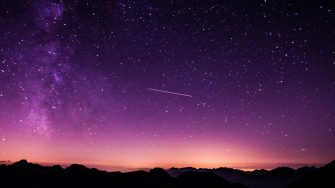
Overview
The UNSW Introduction to Astrobiology (BEES2741) course is a fully online course on the search for life elsewhere in the universe, the origin of life on Earth and the future of life on our planet. It’s a science and general education elective and provides a foundation for the third-level course Astrobiology: Life in the Universe (BEES6741).
Astrobiology is the study of origins, evolution, distribution and the future of life in the universe. UNSW has the only astrobiology research centre in the Southern Hemisphere – The Australian Centre for Astrobiology. The Centre is strongly associated with NASA, and students will have the opportunity to video conference with NASA personnel to support their learning.
Astrobiology is interdisciplinary and ranges from the origin of the Big Bang to the study of microbes that live in extreme environments on Earth. It looks at how life and our planet evolved together and the search for extraterrestrial life in our solar system and beyond. Astrobiology seeks to answer our most profound question: “Are we alone in the universe?” To answer this question, we need to start with the only sample of life we know of – life on Earth – and pose another question: “What is life?” This question leads to other, more intriguing questions that relate to the idea that if we have trouble with a definition of life on Earth, how will we fare with defining life beyond the thin biosphere that envelopes the planet? During the course, you’ll ponder such questions and broaden your knowledge of life and the universe.
Throughout the course, you’ll address astrobiology at an introductory level. You’ll explore microbiological, geological and palaeobiological perspectives of the evolution of life on Earth and elsewhere. Astrobiology allows you to see how all science majors and other areas of science related to astrobiology and the search for life elsewhere in the universe is of general interest. As new rover missions to Mars and space probes explore elsewhere in the solar system, study in astrobiology is more relevant than ever before. are planned by both NASA and the European Space Agency from 2020 onwards. From 2020, NASA and the European Space Agency are planning to release more probs and, from 2030, the first human mission to Mars is set to launch.
Term offering: Term 2
Course attendance: Online Course
Course code: BEES2741
Course breakdown
The course aims to introduce you to the multidisciplinary and interdisciplinary subject of astrobiology. It will equip you with the skills in interdisciplinary thinking and research. On a weekly basis, you’re expected to plan three to four hours completing online modules and additional reading and reflection for three assignments. There is no final exam, and your total course mark will be based on three assignments designed to help you exercise what you have learned.
Upon successful completion of the course, you’ll have the skills to:
- describe, analyse and evaluate the role of an interdisciplinary approach to discoveries in the search for life elsewhere in the solar system
- construct a short primary literature review, demonstrating that you can search for appropriate primary literature and critically review. You’ll also need to demonstrate that you can evaluate the status of the theories of the origin of Earth’s water
- investigate and combine the elements of the evolution of life and our planet, and then to reorganise these concepts into the potential that other planets and moons in our solar system have for past or present life
- recognise the nature of the construct of the phylogenetic Tree of Life and use this model to demonstrate the relatedness of all life on Earth
- explain that truth in science is the best model that we have and that uncertainty about our natural world is at the heart of all science.
Career opportunities
Astrobiologists seek to understand how organisms survive in extreme environments and are dedicated to the exploration of life on other planets. To date, research has helped them identify what a “habitable zone” looks like and technology has enabled them to explore the possibilities of habitability on Mars, Jupiter’s moon Europa and Saturn’s moon Enceladus.
Working in this field offers the most exciting chance to discover the building blocks of life along with new phenomena, exoplanets and even life forms. Australian Centre for Astrobiology graduate students have acquired positions at NASA and other space agencies. Among them is a planetary geologist leading one of the seven experiments on the NASA Mars 2020 rover mission, and another is a Deputy Program Scientist for the same mission.
Relevant roles
- Astrobiologist
- Astrophysicists
- Astronomer
- Physicist
- Planetary geologist
- Microbiologist
What our graduates say
“The information is so fascinating and structured clearly with lots of great videos to support the content. The engagement by Carol and Bonnie was really fantastic. I felt very supported and the feedback provided was very personalised and informative. I felt that a lot of effort went into the course. I really appreciated the structure of the three assessment tasks and no final exam, that really helped reduce pressure and made the learning much more enjoyable!”
- Introduction to Astrobiology: Life in the Universe course graduate.
